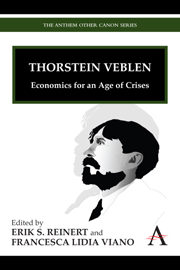Book contents
- Frontmatter
- Contents
- Acknowledgements
- List of Contributors
- 1 Introduction
- 2 Veblen's Contexts: Valdres, Norway and Europe; Filiations of Economics; and Economics for an Age of Crises
- Part One Norwegian Origins and Personal Life
- Part Two American Education
- Part Three Veblen's Politics
- Part Four Veblen's Economics
- 12 Thorstein Veblen: The Father of Evolutionary and Institutional Economics
- 13 Veblen's Words Weighed
- 14 The Great Crash of 2007 Viewed through the Perspective of Veblen's Theory of Business Enterprise, Keynes's Monetary Theory of Production and Minsky's Financial Instability Hypothesis
- 15 Predation from Veblen until Now: Remarks to the Veblen Sesquicentennial Conference
- 16 Capitalising Expectations: Veblen on Consumption, Crises and the Utility of Waste
- 17 Thorstein Veblen: Still Misunderstood, but More Important Now than Ever
- Name Index
- Subject Index
16 - Capitalising Expectations: Veblen on Consumption, Crises and the Utility of Waste
from Part Four - Veblen's Economics
Published online by Cambridge University Press: 05 May 2013
- Frontmatter
- Contents
- Acknowledgements
- List of Contributors
- 1 Introduction
- 2 Veblen's Contexts: Valdres, Norway and Europe; Filiations of Economics; and Economics for an Age of Crises
- Part One Norwegian Origins and Personal Life
- Part Two American Education
- Part Three Veblen's Politics
- Part Four Veblen's Economics
- 12 Thorstein Veblen: The Father of Evolutionary and Institutional Economics
- 13 Veblen's Words Weighed
- 14 The Great Crash of 2007 Viewed through the Perspective of Veblen's Theory of Business Enterprise, Keynes's Monetary Theory of Production and Minsky's Financial Instability Hypothesis
- 15 Predation from Veblen until Now: Remarks to the Veblen Sesquicentennial Conference
- 16 Capitalising Expectations: Veblen on Consumption, Crises and the Utility of Waste
- 17 Thorstein Veblen: Still Misunderstood, but More Important Now than Ever
- Name Index
- Subject Index
Summary
I see enormous conglomerates replace the individual capitalists. I see the stock markets fall prey to the same curse that now claims the casinos.
Friedrich NietzscheThe doctrines which Adam Smith maintained with so much ability, never took so deep hold in this country as in England, and they have been more strongly opposed.
John RaeFew authors are so perennially in the process of being rediscovered as Thorstein Veblen. Most recently, his authority has been summoned to combat the climate crisis, to uncover the meaning of life generally and what it means to be American particularly, and by those seeking to make sense of financial scandals such as those of Enron, Worldcom and Parmalat, not to mention the current global economic turmoil. His theories regarding the moral and material costs of conspicuous consumption are today echoed for wider audiences in works such as Alain de Botton's Status Anxiety and Oliver James's Affluenza, and the phrase ‘Gilded Age’ again enjoys cultural and analytical currency. This chapter contributes to this Veblen Renaissance, but neither by dwelling on the structural and cultural similarities between the crises of his time and ours, nor by using his writings to shed light on the technical origins of modern financial misdemeanours.
- Type
- Chapter
- Information
- Thorstein VeblenEconomics for an Age of Crises, pp. 329 - 352Publisher: Anthem PressPrint publication year: 2012
- 1
- Cited by



